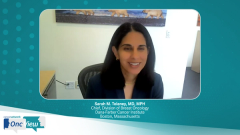
Discussing Treatment Decisions with Patients with Early-Stage HER2+ Breast Cancer
A key opinion leader explains how she discusses treatment options and trial data with patients with early stage HER2+ breast cancer.
Episodes in this series

Sarah M. Tolaney, MD, MPH: I just saw a new patient with HER2 [human epidermal growth factor receptor 2]–positive, early-stage breast cancer, and the visit took over 2 hours. The reason is that there’s a lot to discuss. We have so many treatment options and the outcomes are outstanding, but it’s still a lot of therapy that we’re giving patients, and you need to walk them through all that. Management takes a lot.
For example, this patient was starting preoperative therapy, so we discussed the standard for a preoperative HER2+ patient with stage II or III disease would be TCHP [docetaxel, carboplatin, trastuzumab, pertuzumab]. But I like to make sure the patient is informed of all their options. In fact, there are multiple clinical trials ongoing for early stage disease. One example is a trial that’s really looking at de-escalation of therapy in this setting. For example, CompassHER2-pCR is a large cooperative group trial, which is looking at preoperative THP [docetaxel, trastuzumab, pertuzumab]—for 12 weeks, trastuzumab, and pertuzumab. For patients who achieve PCR [pathologic complete response] with THP [docetaxel, trastuzumab, pertuzumab], they’re allowed to get HP [trastuzumab, pertuzumab] maintenance. This is trying to get rid of the whole TCHP [docetaxel, carboplatin, trastuzumab, pertuzumab] therapy and make it a little simpler, with 1 chemo agent, and for a shorter duration, which is 12 weeks of treatment instead of 18.
We have to pair that down. If people achieve PCR, then you know that that worked. Then we feel comfortable going on to just antibody therapy maintenance.
There’s also another trial called the MARGOT study, which is looking at margetuximab [Margenza], a very novel Fc-engineered monoclonal HER2-directed antibody that’s trying to enhance ADCC [antibody-dependent cell cytotoxicity]. This enhances NK [natural killer] activity in the immune response. We’ve seen data in the metastatic setting suggesting margetuximab performed better than trastuzumab when given with chemotherapy and pretreated HER2+ metastatic disease. It’s an FDA-approved option. But we don’t have data for early stage patients. There’s a trial being run through the TBCRC [Translational Breast Cancer Research Consortium] randomizing patients to taxane-margetuximab-pertuzumab or to THP [docetaxel, trastuzumab, pertuzumab]. It’s trying to use that de-escalated backbone THP [docetaxel, trastuzumab, pertuzumab] but replace the trastuzumab with margetuximab. This is specifically for people who have the CD16A-F allelegenotype. This was the majority of patients in the registration margetuximab study SOPHIA. About 85% to 90% of patients will have the CD16a allele, and then they’re eligible to get randomized to TMP [docetaxel, margetuximab, pertuzumab] or THP [docetaxel, trastuzumab, pertuzumab].
For this patient with stage II HER2+ cancer, I explained that TCHP [docetaxel, carboplatin, trastuzumab, pertuzumab] is a standard that we could think about in the CompassHER2-pCR study with THP [docetaxel, trastuzumab, pertuzumab]. Or we could think about MARGOT with THP [docetaxel, trastuzumab, pertuzumab] vs TMP [tetramethylpyrazine], and we’d have to test her for her genotype. Then we started talking about adverse effects from treatment and thinking about hair loss and whether you want to do scalp cooling. For a young woman, you want to think about fertility preservation prior to starting treatment. If she got HP [trastuzumab, pertuzumab] as the standard of care, would we want to use Phesgo or IV [intravenous]? There’s so much stuff to think about when starting a patient on therapy. It’s important to make sure patients are informed of all their options up front and that they’re also told about clinical trial options. For a HER2+ patient, this may allow them to get less therapy and achieve the same efficacy with less toxicity. Then we think about supportive measures for that patient, things like scalping and using Phesgo to try to make their time in the clinic shorter. This is a very complex discussion, but thankfully it’s a disease with very good outcomes.
Transcript edited for clarity.
Newsletter
Stay up to date on recent advances in the multidisciplinary approach to cancer.






































